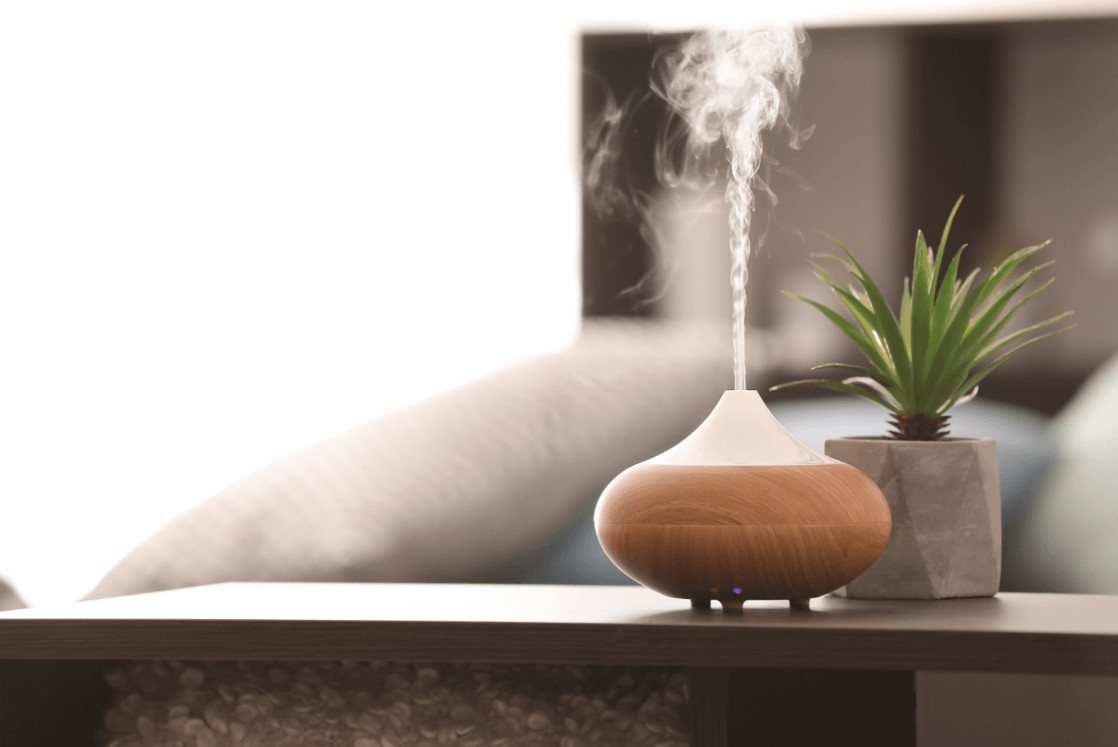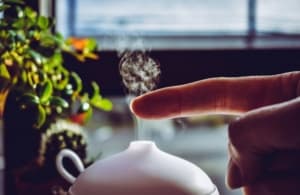Top 11 Essential Oil Diffuser Benefits For Health & Wellness

There are many benefits to adding an essential oil diffuser to your home. So, it’s not just a way to make your living space smell nice. Although that is definitely a beautiful side effect. Though science hasn’t totally confirmed it, many people have reported a positive effect on the body when using essential oils. But you should choose wisely and not just use the oils indiscriminately.
Essential oils are concentrated extracts of various plants. Practitioners use them in natural and alternative health practices such as aromatherapy and naturopathy. Many plants contain some potentially helpful compounds. However, in many cases, there isn’t enough evidence to suggest their use as a treatment or cure for ailments.
You can inhale essential oils or apply them directly to the skin. They can stimulate your sense of smell and have medicinal effects when absorbed. Emotions are often said to be the root cause of many physical illnesses. When you breathe oil molecules in from the essential oil diffuser, they activate your amygdala. The amygdala is the part of the brain which manages your emotions and memories. So this gives us a bit of a better understanding of the effects of an essential oil diffuser. Let’s take a deeper look into the benefits, but before we do what’s the difference between a diffuser and a humidifier?
Diffuser Vs Humidifier Explained

Learn about the differences between diffusers and humidifiers.
If you’re not sure what the difference is between the two, here is the diffuser vs humdifier explained. There are some diffusers that can also be humidifiers. And there are some humidifiers that can act as oil diffusers. But they are each different, with different purposes. The main difference is that diffusers are generally smaller devices designed to be used with essential oils. Conversely, humidifiers are typically larger devices designed to regulate the moisture levels in the air.
There are four types of essential oil diffusers. They include the ultrasonic diffuser, the nebulizing diffuser, the heat diffuser, and the evaporative diffuser.
They are designed for vaporizing a fine mist, using the essential oils with a cold effect to aromatize the room. Diffusers work well for enhancing the mood within a room by distributing essential oils. The cool mist can have a purifying effect on the air around it.
The oil that diffusers diffuse results in a fine mist. Your skin can absorb the mist to have a relaxing or stimulating effect. This is especially useful if you have dry skin.
A humidifier is a device designed to keep a set level of moisture in the room. Moisturizing the air in a room is essential in dry climates. It’s also good in some climates where people use heat in the fall and winter. Dry air can cause problems with dry skin. It can also lead to bacterial and viral problems. Plus, it more difficult for people to fall asleep. Many people use a humidifier for treating the symptoms of colds, the flu, and sinus congestion. Humidifiers are different from essential oils diffusers in that most humidifiers in today’s market do not support the mixing of essential oils for distribution in the air. Because most humidifiers have plastic components, they are incompatible with essential oils. The oils, particularly citrus ones, can break down the plastic components of this device.
Your essential oils are dispersed with a nebulizing diffuser. This makes it much easier for you to inhale it and your body to absorb it. A humidifier will not work in a similar manner. It will only disperse the oils in the air, but not nebulize it.
A few humidifiers are designed to work both as a humidifier and a diffuser. Depending on your needs, you can have a diffuser that operates in both ways – as a diffuser and a humidifier. Or, you can purchase them as separate units. The trend now is to use a multipurpose diffuser that does both functions – diffuse and humidify.
Top 11 Essential Oil Diffuser Benefits
1. Immune System

Lemon essential oil can help strengthen your immune system.
You can strengthen your immune system over time by diffusing lemon, eucalyptus, rosemary, or tea tree essential oils. The theory is that essential oil diffusers have been shown to be useful in treating some influenza viruses, E. coli, and some staph strains.
2. Remove Pathogens
Essential oil diffusers eliminate unpleasant odors and airborne pathogens with tea tree, eucalyptus, or lemon/lemongrass oil. They are effective in helping to remove pathogens like airborne influenza droplets within 15 minutes.
3. Increase Focus

Diffusing essential oils can help improve your focus.
To increase focus and alertness, try vetiver essential oil. Rosemary essential oil is also reputed to improve alertness, eliminate negative moods, and increase the retention of information by enhancing concentration and reducing fogginess.
4. Weight Loss
Several essential oils can suppress cravings, increase metabolism, reduce fluid retention and helps alleviate emotional stress and stress eating. Grapefruit is one of the best essential oils for weight loss due to its d-limonene. It helps in releasing fatty acids into the bloodstream, where the body breaks them down and uses them for energy. It has long been used for various health benefits like metabolism stimulation, lymphatic system detox and fat burning.
5. Reduce Coughing
Many asthma and allergy sufferers find a great benefit in diffusing clove or peppermint essential oils to help reduce symptoms. More common are rosemary and eucalyptus oils to reduce coughing and wheezing.
6. Sleep

Lavender essential oil can help you get a better night’s sleep.
To assist in sleeping, many have found success in diffusing lavender, even to the point of growing their own. Lavender oil lowers your heart rate and blood pressure and increases drowsiness.
7. Relaxation
For relaxation and to relieve tension, jasmine is one of the most calming of the essential oils. It is often the go-to oil for massage therapy. It can also soothe the nervous system.
8. Mood
Often referenced as the “king of essential oils” for its variety of uses and benefits, frankincense is known to be a mood enhancer and energy increaser. It positively stimulates your brain’s limbic system, the part of your brain that controls emotions.
9. Relieving Headaches

Try peppermint essential oil for headaches.
For treating migraines or headaches, many find relief with peppermint oil. The active ingredient in peppermint is menthol. It shows to be effective even when you apply it topically to the temples of your head.
10. Pain Relief
With its anti-inflammatory effects, many turn to cedarwood essential oil to provide natural pain relief in joints, tissues, and muscles. Additionally, cedarwood is known for its ability to reduce flare-ups of eczema when applied topically.
11. Wounds
Because cypress essential oil is antimicrobial and antibacterial, it can help clean and heal cuts and wounds. People have been using it for centuries.
How To Clean Essential Oil Diffusers

Make sure to clean your diffuser in order to prevent cross-contamination.
Of course, you will need to clean your diffuser, especially when switching between different oils. Always unplug your diffuser before cleaning. The cleaning is really not for the purpose that you’d think. It is not so much to prevent mold and mildew. This is because many of the essential oils are, by nature, potent germ fighters. But if you are diffusing lavender to help relax but didn’t first clean it after diffusing an oil such as grapefruit, the cross-contamination simply will make the lavender ineffective.
Begin with filling your diffuser tank with clean water to the halfway mark. Add to the water about a tablespoon of white vinegar. Then let the mixture run in the diffuser for a few minutes. This method will clean as well as disinfect. Drain the diffuser completely. You can substitute rubbing alcohol for the white vinegar, as it will be effective in removing oil buildup.
Use either a soft cloth, cotton swab, or small brush to wipe down the diffuser’s tank. Target any stuck-on grime on the sides of the tank. These can dilute smells when you use your diffuser. Make sure to wipe any grime off of the mist chip on your diffuser. If something is blocking it, it can cause a diffuser to run improperly.
Once the inside is clean, take a soft rag, cotton swab, or brush dampened with water. Wipe off any dirt, debris, or smudges like fingerprints from the diffuser.
You can safely clean most diffusers using the method above. However, every diffuser is different. Yours may have special cleaning instructions, so refer to these when cleaning the diffuser. You’ll want to be careful not to get any water into the buttons or under the machine.
Conclusion
Essential oils, properly used, are safe and effective for many routine issues. Contrary to what several essential oil companies recommend, you should generally not swallow the oils. Because pure essential oils are potent, diluting them in a carrier oil is the best way to avoid a bad reaction when applying directly to the skin. If you get a red, itchy rash or hives after applying essential oils, see a doctor. You may be having an allergic reaction.
Essential oils can lift your mood and make you feel good with just a whiff of their fragrance. For some people, they may even help alleviate the symptoms of various conditions, including symptoms of depression.
An essential oil is a concentrated liquid extracted from a plant. Aromatherapy is an alternative therapy based on the use of these oils. Aromatherapists believe that each essential oil offers a different set of health benefits.
Research supports some of the health benefits of certain essential oils. Yet other claims are based on many years of tradition. Most historians credit the Egyptians of around 3000 BCE as the first culture to use aromatic extracts. They did so for beauty, culinary uses, and overall wellness. So we have them to thank for all of these benefits!


